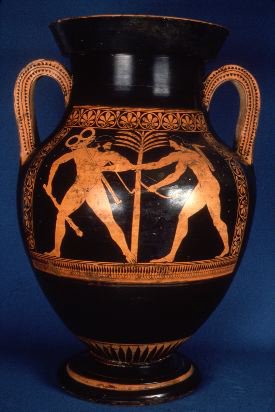The Struggle for the
Delphic Tripod
After completing his twelve labors, Hercules hit the road, once again. Somehow or another, Hercules caught wind that Eurytus, the prince of Oechalia, was offering his beautiful daughter, Iole, as a bride prize to any man who could best him and his sons in an archery contest. Upon hearing this, Hercules traveled to Oechalia and competed against Eurytus and his sons. Legend has it that Eurytus was the man who first schooled Hercules in the use of the bow. His was a challenge that pitted student against teacher. It should come as no surprise that Hercules defeated his fellow contestants with ease.
| When it came time, however, for Eurytus to hand over Iole to Hercules, as his bride, Eurytus refused. In this decision he was supported by all of his sons except Iphytus. One may wonder why a prince would deny the strongest man in the world his daughter in marriage. For Eurytus, the reasoning was simple: he would not allow his beloved daughter to marry (and eventually have children with) a man who had a history of murdering his sons in a fit of rage (remember that whole Megara fiasco?), for fear that the same fate would befall his own grandchildren. |

Boston 13.195, Attic red figure lekythos, c. 510 B.C.
A youth with cattle
From Caskey & Beazley, plate IV. With permission of the Museum of Fine Arts, Boston
Crestfallen and dismayed, Hercules left Oechalia. Shortly after Hercules' departure, some mares (or cattle, depending on the storyteller) were stolen by Autolycus from a local man. Eurytus instantly thought that Hercules was the culprit. Iphytus, however, refused to believe that Hercules was the thief and set out to pay him a visit at Tiryns (another version suggests Iphytus went to Tiryns to look for the cattle himself). Hercules received Iphytus in good cheer and the two men passed the time entertaining each other. Unfortunately for Iphytus, however, during the visit something went awry, and Hercules, in another fit of madness, hurled Iphytus to his death from the top of the walls of Tiryns.

The Mycenaean citadel of Tiryns: West walls from the southwest
Photograph courtesy of the Department of Archaeology, Boston University,
Saul S. Weinberg Collection
Following the murder of Iphytus, Hercules contracted a terrible disease, as a result of his violent outburst. Hercules then journeyed to the oracle at Delphi, in hopes that the priestess there would advise him on how to cure himself. But Hercules was to be disappointed. When he questioned the Pythian priestess, she was unable to answer him in oracles. Hercules, outraged at priestesses unwillingness to help, began tearing the temple apart. When Hercules came upon the Delphic tripod, he started to make off with it, thinking that he would establish an oracle of his own.
Apollo, however, was not about to let Hercules carry off the prized tripod from his sacred site. He began to wrestle with Hercules over its possession; Apollo was supported by his sister, Artemis, while Hercules was supported by his patron, Athena. In the midst of their tug-of-war contest, Zeus dropped in and tried to break up the feuding brothers (Apollo and Hercules are, after all, half-brothers by Zeus). And as parents are often forced to do, Zeus decided that it would be best to separate the brothers, hurling one of his mighty thunderbolts between them. After the two siblings were pried apart, Hercules finally received an oracle, instructing him to be sold into slavery for a year, and to pay Eurytus in compensation for the loss of his son. The tripod remained at Delphi and Hermes sold Hercules to Omphale, Queen of Lydia, for whom he performed women's work for his year of servitude.
|

Delphi, Siphnian Treasury Frieze--East
Above, East pediment, showing Zeus breaking up the fight between Hercules and Apollo for the tripod
Photograph by Maria Daniels, courtesy of the Greek Ministry of Culture and the Delphi Museum
(caw/acs)
To read more about these topics, see Further Resources.
- Hercules and Hesione, the princess of Troy
- Hercules and the struggle for the Delphic tripod
- Hercules and the Giants
This exhibit is a subset of materials from the Perseus Project digital library and is copyrighted. Please send us your comments.

